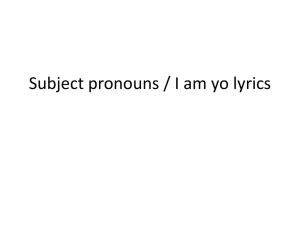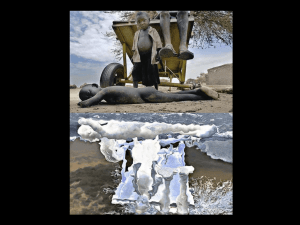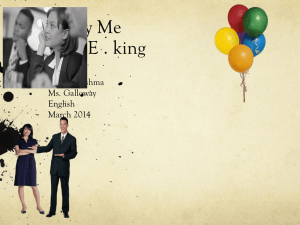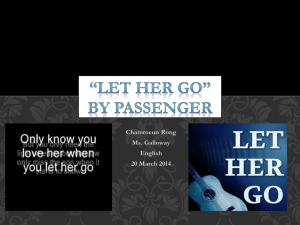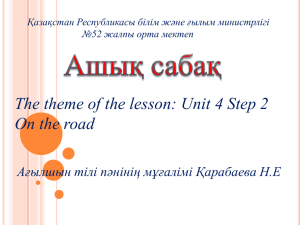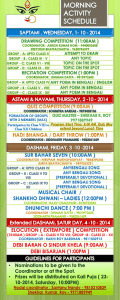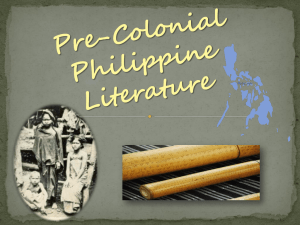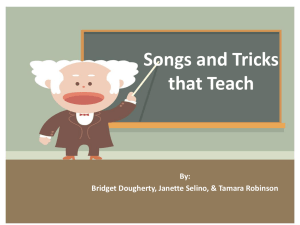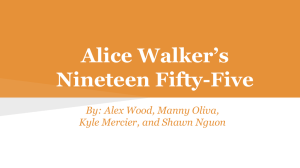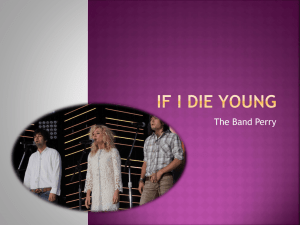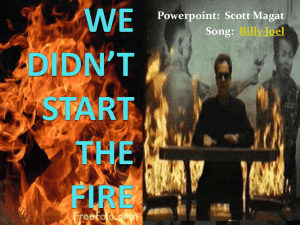MusicandPictureBooks..
advertisement
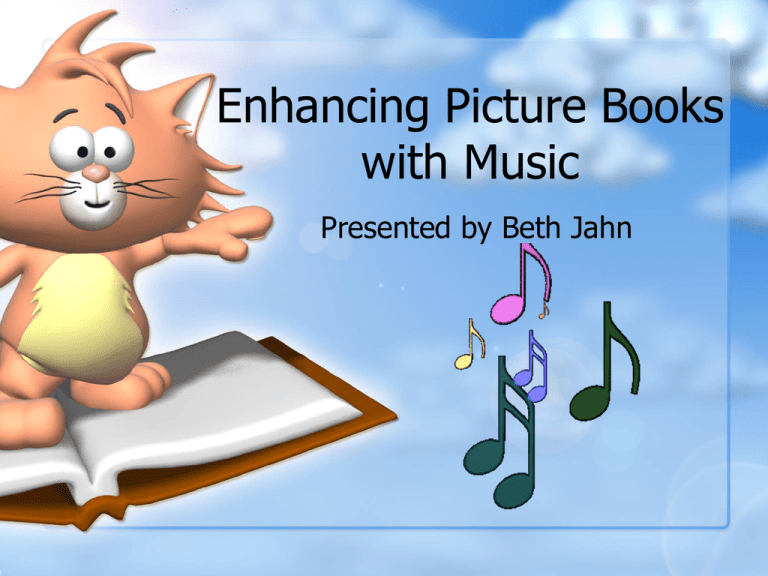
Enhancing Picture Books with Music Presented by Beth Jahn Suggestions for using music to enhance picture books: • Read/Sing picture books with a known song text. • Sing the text of a book which is not based on a song. • Use instruments (or found sounds) to create sound effects for a story. • Add instruments for each different character/event of a story. • Use recorded music as a “sound track” for a story. • Choose a simple song (nursery rhymes or other children’s songs) to represent the characters/events of a story. • Create a simple song based on the text of a picture book or inspired by the events of the book. Read/Sing picture books with a known song text. • A-Hunting We Will Go by John Langstaff • Miss Mary Mack by Mary Ann Hoberman • Old Macdonald by Pam Adams • Give the Dog a Bone by Steven Kellog • My Favorite Things by Renee Graef • Mary Wore Her Red Dress by Merle Peek • Joseph Had A Little Overcoat by Simms Tabak •Yankee Doodle by Patti Goodnow • Skip to My Lou by Nadine Bernard Westcott • What a Wonderful World by Bob Thiele • Books by Iza Trapini • The Itsy Bitsy Spider • I’m A Little Teapot • Row, Row, Row Your Boat Sing the text of a book that is not based on a song. • Brown Bear, Brown Bear by Eric Carle can be sung to the tune of Twinkle, Twinkle Little Star. • Old Black Fly by Jim Aylesworth can be sung to the tune of Joshua Fit the Battle of Jericho or to the tune of Skip to My Lou. • Frog in the Kitchen Sing by Jim Post can be sung to the tune of Skip to My Lou. • Barnyard Dance by Susan Boynton can be sung to the tune of Turkey in the Straw. • Is Your Mama a Llama by Deborah Guarino can be sung to the tune of The Irish Washerwoman. Books with rhyming texts will be your best bet for this type of activity because of the even phrasing. Use instruments (or found sounds) to create sound effects for a story. A few examples: • The Little Old Lady Who Wasn’t Afraid of Anything by • The Three Billy Goats Gruff • Baby Rattlesnake by Te Ata • Listen to the Rain by Bill Martin Jr. and John Archambault • Rattlebone Rock by Silvia Andrews Don’t have instruments in your classroom? Ask your music specialist ahead of time if he/she would let you borrow some. You can also use items around the classroom as “found sounds.” Solicit ideas from your students. Add instruments for each different character/event of a story. • Jump, Frog, Jump by Robert Kalan • The Napping House by Audrey Wood • The Little Old Lady Who Was Not Afraid of Anything by Linda Williams • This is the House That Jack Built by Simms Tabak • The Mitten by Jan Brett • Too Much Noise by Ann McGovern • Hattie and the Fox by Mem Fox The Napping House By Audrey Wood Process for The Napping House: • Read the book. • Have students choose an instrument to represent each of the characters/objects: • napping house • cozy bed • snoring granny • dreaming child • dozing dog • snoozing cat • slumbering mouse • wakeful flea • Read the book again adding the instrument sounds in the appropriate places. Use recorded music as a “sound track” for a story. This can be either well-known pieces of music or lesser known pieces of your choosing that you feel match the mood of the story. • Dream Snow by Eric Carle with Debussy’s Snow is Falling • Little Beaver and the Echo with Cristofori’s Dream by David Lanz • The Rainbow Fish by Marcus Pfister with Aquarium by SaintSaens • Birds of A Feather by Willi Baum with The Aviary by SaintSaens • The Banshee by Karen Ackerman/David Ray with Henry Cowell’s Banshee • Autumn Leaves by Ken Robbin’s with Vivaldi’s Autumn • Barn Dance by Bill Martin Jr. and John Archambault with Hoedown by Aaron Copland Use recorded music as a “sound track” for a story. This can be either well-known pieces of music or lesser known pieces of your choosing that you feel match the mood of the story. • Grandfather Twilight by Barbara Berger with Au Clair de la Lune by Debussy. •The Dancing Skeleton by Cynthia DeFelice with Danse Macabre by Saint-Saens • I See A Song by Eric Carle with Bydlo (The Ox Cart) by Mussorgsky (from Pictures at an Exhibition) • Tuesday by David Weisner with Ride of the Valkyries by Wagner • Arturo’s Baton by Syd Hoff With Eine Kleine Nacht Musik by Mozart • Earth Dance by Joanne Ryder and Norman Gorbaty with Serenade in d Minor by Dvorak • Tim O’Toole and the Wee Folk by Gerald McDermott with The Irish Washerwoman The Giving Tree by Shel Silverstein Read with Simple Gifts from Appalacian Spring by Aaron Copland The Kissing Hand By Audrey Penn Read with Liebestraum No. 3 in A Flat by Franz Liszt Snowmen at Night By Caralyn Bruehner Read with Eine Kleine Nachtmusik by Mozart The Rainbow Fish By Marcus Pfister Read with The Aquarium (from Carnival of the Animals) By Saint-Saens Choose a simple song (or poem or fingerplay or movement activity) to represent the characters/events of a story. The First Song Ever Sung by Laura Krauss Melmed and Ed Young • Father’s Song: Yankee Doodle • Brother’s Song: Clap, Clap, Clap Your Hands • Sister’s Song: Ding Dong I’ve Got the Rhythm in my Head • Grandmother’s Song: Sarasponda • Grandfather’s Song: Oats, Peas, Beans and Barley Grow/Down on Grandpa’s Farm • Dog’s Song: My Little Puppy (My Dog Rags) • Minnow’s Song: Three Little Fishies • Bird’s Song: Here Comes a Bluebird • Mother’s Song: Twinkle, Twinkle Little Star Carnival of the Animals by Barrie C. Turner and Sue Williams • The Lion – The Lion Sleeps Tonight/Goin’ on a Lion Hunt (iTunes) • Hens and Roosters – Chicken on a Fencepost/The Chicken Dance • Mules – Hold My Mule While I Dance Josey (150 American Folk Songs) • Tortoises – Miss Suzie Had a Turtle/Lots of turtle fingerplays or poems • The Elephant – One Elephant Went Out to Play/ • Kangaroos – The Kangaroo Hop (MK8)/Tie Me Kangaroo Down, Sport • Aquarium – Three Little Fishies/Ten Little Fish (Twin Sisters Productions) • Donkeys – Tingalayo, The Donkey • Cuckoo in the Woods – Cuckoo, Where Are You? • The Aviary – Bluebird, Bluebird/Here Comes a Bluebird/Little Bird (Kriske and DeLelles) • Pianists – Scales and Arpeggios (from The Aristocats) • Fossils – Rattlin’ Bones (MK8)/Dem Bones/Skin and Bones Create a simple song based on the text of a picture book or inspired by the events of the book. • Click, Clack, Moo Cows That Type by Doreen Cronin • Mortimer by Robert Munsch • Many other possibilities Click, Clack, Moo Cows That Type By Doreen Cronin Leroy Anderson 1908-1975 The Typewriter Process for Click Clack Moo Cows That Type: • Look at a picture of a typewriter and discuss • Listen to The Typewriter by Leroy Anderso • Read Click, Clack Moo Cows That Type by Doreen Cronin. • Learn melody of Click Clack Moo by solfege and hand signs • Add text to melody • Transfer melody to alto xylophones • Pat the beat to prepare bass xylophone part. Transfer to BX • Practice the glockenspiel part by snapping. Transfer to glockenspiels. • Add triangle and ratchet sound effects for carriage return • Read the book with song performance included Mortimer By Robert Munsch Process for Mortimer: • Teach Clang Clang by echo imitation. • Pat half note pulse to prepare the bass xylophone part. Transfer to BX. • Add a stamp every time the word clang is sung. • Add two pats on the word rattle. • Add two claps for bing bang. • Transfer body percussion to cowbell, tambourine, and tick-tock block. • Practice patting the ascending and descending patterns for the steps. Transfer to barred instruments. • Read book with song and sound effects.

